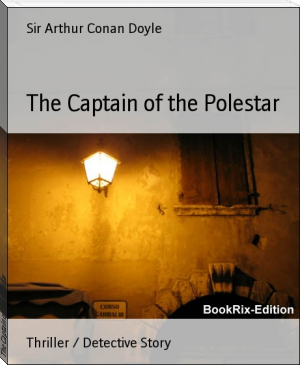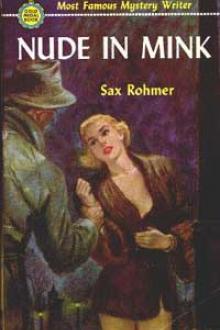The Captain of the Polestar by Sir Arthur Conan Doyle (i can read with my eyes shut .txt) 📖

- Author: Sir Arthur Conan Doyle
Book online «The Captain of the Polestar by Sir Arthur Conan Doyle (i can read with my eyes shut .txt) 📖». Author Sir Arthur Conan Doyle
It has been remarked that an oath had, for the last few weeks, been a rare thing in the camp. We made up for our temporary abstention during the next half-hour. Never was heard such symmetrical and heartfelt blasphemy. When at last we succeeded in getting the door off its hinges all sight of both rangers and treasure had disappeared, nor have we ever caught sight of either the one or the other since. Poor Woburn, true to his trust, lay shot through the head across the threshold of his empty store. The villains, Maule and Phillips, had descended upon the camp the instant that we had been enticed into the trap, murdered the keeper, loaded up a small cart with the booty, and got safe away to some wild fastness among the mountains, where they were joined by their wily leader.
Jackman's Gulch recovered from this blow, and is now a flourishing township. Social reformers are not in request there, however, and morality is at a discount. It is said that an inquest has been held lately upon an unoffending stranger who chanced to remark that in so large a place it would be advisable to have some form of Sunday service. The memory of their one and only pastor is still green among the inhabitants, and will be for many a long year to come.
THE RING OF THOTH.
Mr. John Vansittart Smith, F.R.S., of 147-A Gower Street, was a man whose energy of purpose and clearness of thought might have placed him in the very first rank of scientific observers. He was the victim, however, of a universal ambition which prompted him to aim at distinction in many subjects rather than preeminence in one.
In his early days he had shown an aptitude for zoology and for botany which caused his friends to look upon him as a second Darwin, but when a professorship was almost within his reach he had suddenly discontinued his studies and turned his whole attention to chemistry. Here his researches upon the spectra of the metals had won him his fellowship in the Royal Society; but again he played the coquette with his subject, and after a year's absence from the laboratory he joined the Oriental Society, and delivered a paper on the Hieroglyphic and Demotic inscriptions of El Kab, thus giving a crowning example both of the versatility and of the inconstancy of his talents.
The most fickle of wooers, however, is apt to be caught at last, and so it was with John Vansittart Smith. The more he burrowed his way into Egyptology the more impressed he became by the vast field which it opened to the inquirer, and by the extreme importance of a subject which promised to throw a light upon the first germs of human civilisation and the origin of the greater part of our arts and sciences. So struck was Mr. Smith that he straightway married an Egyptological young lady who had written upon the sixth dynasty, and having thus secured a sound base of operations he set himself to collect materials for a work which should unite the research of Lepsius and the ingenuity of Champollion. The preparation of this magnum opus entailed many hurried visits to the magnificent Egyptian collections of the Louvre, upon the last of which, no longer ago than the middle of last October, he became involved in a most strange and noteworthy adventure.
The trains had been slow and the Channel had been rough, so that the student arrived in Paris in a somewhat befogged and feverish condition. On reaching the Hotel de France, in the Rue Laffitte, he had thrown himself upon a sofa for a couple of hours, but finding that he was unable to sleep, he determined, in spite of his fatigue, to make his way to the Louvre, settle the point which he had come to decide, and take the evening train back to Dieppe. Having come to this conclusion, he donned his greatcoat, for it was a raw rainy day, and made his way across the Boulevard des Italiens and down the Avenue de l'Opera. Once in the Louvre he was on familiar ground, and he speedily made his way to the collection of papyri which it was his intention to consult.
The warmest admirers of John Vansittart Smith could hardly claim for him that he was a handsome man. His high-beaked nose and prominent chin had something of the same acute and incisive character which distinguished his intellect. He held his head in a birdlike fashion, and birdlike, too, was the pecking motion with which, in conversation, he threw out his objections and retorts. As he stood, with the high collar of his greatcoat raised to his ears, he might have seen from the reflection in the glass-case before him that his appearance was a singular one. Yet it came upon him as a sudden jar when an English voice behind him exclaimed in very audible tones, "What a queer-looking mortal!"
The student had a large amount of petty vanity in his composition which manifested itself by an ostentatious and overdone disregard of all personal considerations. He straightened his lips and looked rigidly at the roll of papyrus, while his heart filled with bitterness against the whole race of travelling Britons.
"Yes," said another voice, "he really is an extraordinary fellow."
"Do you know," said the first speaker, "one could almost believe that by the continual contemplation of mummies the chap has become half a mummy himself?"
"He has certainly an Egyptian cast of countenance," said the other.
John Vansittart Smith spun round upon his heel with the intention of shaming his countrymen by a corrosive remark or two. To his surprise and relief, the two young fellows who had been conversing had their shoulders turned towards him, and were gazing at one of the Louvre attendants who was polishing some brass-work at the other side of the room.
"Carter will be waiting for us at the Palais Royal," said one tourist to the other, glancing at his watch, and they clattered away, leaving the student to his labours.
"I wonder what these chatterers call an Egyptian cast of countenance," thought John Vansittart Smith, and he moved his position slightly in order to catch a glimpse of the man's face. He started as his eyes fell upon it. It was indeed the very face with which his studies had made him familiar. The regular statuesque features, broad brow, well-rounded chin, and dusky complexion were the exact counterpart of the innumerable statues, mummy-cases, and pictures which adorned the walls of the apartment.
The thing was beyond all coincidence. The man must be an Egyptian.
The national angularity of the shoulders and narrowness of the hips were alone sufficient to identify him.
John Vansittart Smith shuffled towards the attendant with some intention of addressing him. He was not light of touch in conversation, and found it difficult to strike the happy mean between the brusqueness of the superior and the geniality of the equal. As he came nearer, the man presented his side face to him, but kept his gaze still bent upon his work. Vansittart Smith, fixing his eyes upon the fellow's skin, was conscious of a sudden impression that there was something inhuman and preternatural about its appearance. Over the temple and cheek-bone it was as glazed and as shiny as varnished parchment. There was no suggestion of pores. One could not fancy a drop of moisture upon that arid surface. From brow to chin, however, it was cross-hatched by a million delicate wrinkles, which shot and interlaced as though Nature in some Maori mood had tried how wild and intricate a pattern she could devise.
"Ou est la collection de Memphis?" asked the student, with the awkward air of a man who is devising a question merely for the purpose of opening a conversation.
"C'est la," replied the man brusquely, nodding his head at the other side of the room.
"Vous etes un Egyptien, n'est-ce pas?" asked the Englishman.
The attendant looked up and turned his strange dark eyes upon his questioner. They were vitreous, with a misty dry shininess, such as Smith had never seen in a human head before. As he gazed into them he saw some strong emotion gather in their depths, which rose and deepened until it broke into a look of something akin both to horror and to hatred.
"Non, monsieur; je suis Fransais." The man turned abruptly and bent low over his polishing. The student gazed at him for a moment in astonishment, and then turning to a chair in a retired corner behind one of the doors he proceeded to make notes of his researches among the papyri. His thoughts, however refused to return into their natural groove. They would run upon the enigmatical attendant with the sphinx-like face and the parchment skin.
"Where have I seen such eyes?" said Vansittart Smith to himself. "There is something saurian about them, something reptilian. There's the membrana nictitans of the snakes," he mused, bethinking himself of his zoological studies. "It gives a shiny effect. But there was something more here. There was a sense of power, of wisdom--so I read them--and of weariness, utter weariness, and ineffable despair. It may be all imagination, but I never had so strong an impression. By Jove, I must have another look at them!" He rose and paced round the Egyptian rooms, but the man who had excited his curiosity had disappeared.
The student sat down again in his quiet corner, and continued to work at his notes. He had gained the information which he required from the papyri, and it only remained to write it down while it was still fresh in his memory. For a time his pencil travelled rapidly over the paper, but soon the lines became less level, the words more blurred, and finally the pencil tinkled down upon the floor, and the head of the student dropped heavily forward upon his chest.
Tired out by his journey, he slept so soundly in his lonely post behind the door that neither the clanking civil guard, nor the footsteps of sightseers, nor even the loud hoarse bell which gives the signal for closing, were sufficient to arouse him.
Twilight deepened into darkness, the bustle from the Rue de Rivoli waxed and then waned, distant Notre Dame clanged out the hour of midnight, and still the dark and lonely figure sat silently in the shadow. It was not until close upon one in the morning that, with a sudden gasp and an intaking of the breath, Vansittart Smith returned to consciousness. For a moment it flashed upon him that he had dropped asleep in his study-chair at home. The moon was shining fitfully through the unshuttered window, however, and, as his eye ran along the lines of mummies and the endless array of polished cases, he remembered clearly where he was and how he came there. The student was not a nervous man. He possessed that love of a novel situation which is peculiar to his race. Stretching out his cramped limbs, he looked at his watch, and burst into a chuckle as he observed the hour. The
 However, all readers - sooner or later - find for themselves a literary genre that is fundamentally different from all others.
However, all readers - sooner or later - find for themselves a literary genre that is fundamentally different from all others. 




Comments (0)